|
|
|
Sort Order |
|
|
|
Items / Page
|
|
|
|
|
|
|
| Srl | Item |
| 1 |
ID:
155097
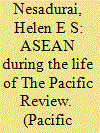

|
|
|
|
|
| Summary/Abstract |
Recent studies of ASEAN have focused on why ASEAN community building has emphasised liberal norms such as human rights, democracy promotion and a commitment to wider participation while maintaining a set of sovereignty-preserving regional principles – the ASEAN Way norms – that have been more suited to securing illiberal agendas and the authoritarian practices of state elites. ASEAN's seeming progressive turn is argued to be instrumentally aimed at buttressing the legitimacy of the grouping as a credible regional institution in international society in which these norms are widely accepted though not uncontested. With recent developments suggesting further consolidation of, or a return to, authoritarian tendencies across the region, state-based modes of governance may become more limited in terms of what ASEAN member states are prepared to endorse. It is, therefore, time for scholars to expand analysis to explore how transnational issues and problems may be functionally governed outside of formal regional institutions involving non-state actors in key roles. While the turn to privately generated standards, rules and practices in global governance is well-recognised and researched, the disparate studies on private governance in South-East Asia are rarely cumulated into a more coherent research programme that addresses the effectiveness of private governance as well as its normative implications. These questions point to a promising agenda for research on regional and other transnational modes of governance in South-East Asia.
|
|
|
|
|
|
|
|
|
|
|
|
|
|
|
|
| 2 |
ID:
149302
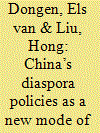

|
|
|
|
|
| Summary/Abstract |
Existing studies of Chinese diaspora policies have mostly focused on the evolution and content of these policies, which tend to be confined within the realm of domestic politics. Against the backdrop of China’s increasing integration into the global economy, as well as its expanding interests abroad, this article goes beyond the existing frameworks in the studies of both domestic Chinese politics and diaspora relations by analyzing China’s diaspora policies from the angle of transnational governance. Relying on policy documents, relevant data from institutions involved, and interviews and participatory observation at both central and provincial levels, the article argues that a state-centered approach in which the Chinese overseas are ‘coopted’ neglects how the engagement with transnational social actors, especially the new migrants, alters existing state structures and how the actions of Chinese overseas are driven by various motives and interests.
|
|
|
|
|
|
|
|
|
|
|
|
|
|
|
|
| 3 |
ID:
091713
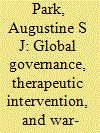

|
|
|
|
|
| Publication |
2009.
|
| Summary/Abstract |
The victimization of girls in armed conflict has garnered increased attention, yet recent scholarship shows that postconflict measures fail to meet girls' unique needs. This article examines gendered discourses employed in programming designed to assist girls following Sierra Leone's decade-long civil war, drawing on fieldwork conducted as part of a continuing program of study on peacebuilding in Sierra Leone. Specifically, the article presents a case study examining discourse relating to war-affected girls in one Freetown-based NGO, Connecting for Peace, which delivered programming to boys and girls affected by the war.
|
|
|
|
|
|
|
|
|
|
|
|
|
|
|
|
| 4 |
ID:
094914
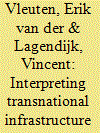

|
|
|
|
|
| Publication |
2010.
|
| Summary/Abstract |
Recent transnational blackouts exposed two radically opposed interpretations of Europe's electricity infrastructure, which inform recent and ongoing negotiations on transnational electricity governance. To EU policy makers such blackouts revealed the fragility of Europe's power grids and the need of a more centralized form of governance, thus legitimizing recent EU interventions. Yet to power sector spokespersons, these events confirmed the reliability of transnational power grids and the traditional decentralized governance model: the disturbances were quickly contained and repaired. This paper inquires the historic legacies at work in these conflicting interpretations and associated transnational governance preferences. It traces the power sector's interpretation to its building of a secure transnational power grid from the 1950s through the era of neoliberalization. Next it places the EU interpretation and associated policy measures against the historical record of EU attempts at transnational infrastructure governance. Uncovering the historical roots and embedding of both interpretations, we conclude that their divergence is of a surprisingly recent date and relates to the current era of security thinking. Finally we recommend transnational, interpretative, and historical analysis to the field of critical infrastructure studies.
|
|
|
|
|
|
|
|
|
|
|
|
|
|
|
|
| 5 |
ID:
155487


|
|
|
|
|
| Summary/Abstract |
Many scholars and policymakers see transnational governance as a substitute for lackluster national and international policies, particularly in the context of intergovernmental gridlock or limited state capacity. The bulk of the literature explains sub- and non-state actors’ participation in transnational initiatives as a product of, on the one hand, micro-level incentives and, on the other, diffusion processes that create and spread normative and market-based pressures. We argue that such theoretical perspectives overlook the dynamic relationship between national policies and transnational governance. First, we argue that ambitious national policies positively affect sub- and non-state actors’ participation in transnational governance. Second, we posit that domestic institutions condition the effects of micro-level incentives and transnational pressures on participation in transnational governance. We test these claims in the climate regime, using an original dataset that, for the first time, measures cross-national participation in transnational climate initiatives across jurisdictions. The results support our expectations. They therefore suggest that we should understand national policies and transnational governance as complements, rather than competitors, to one another. Finally, by showing how and when national policies affect participation in transnational initiatives, we identify important scope conditions for their significance in addressing climate change.
|
|
|
|
|
|
|
|
|
|
|
|
|
|
|
|
| 6 |
ID:
108242


|
|
|
| 7 |
ID:
146203
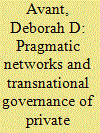

|
|
|
|
|
| Summary/Abstract |
In 2004 private military and security companies lacked effective transnational governance. Ten years later, however, an agreed-upon framework drew these services within established international law. It inspired various complementary non-binding instruments and instigated changes in government policy. Hegemonic-order theories, whether realist or liberal, would expect this change to reflect shifts in US preferences. But the United States displayed no initial interest in transnational coordination. I build an alternative explanation from pragmatism and network theory. A Swiss-led process created connections among stakeholders around the problem of regulating private military and security companies. Relatively open interactions among participants spurred original ideas, which in turn appeared useful for addressing the issue. Their usefulness, led more actors to “buy into” the process. This relational-pragmatic account offers new ways for understanding the nature and development of governance.
|
|
|
|
|
|
|
|
|
|
|
|
|
|
|
|
| 8 |
ID:
192536
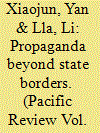

|
|
|
|
|
| Summary/Abstract |
Today, authoritarian states, such as that of China, strive to cultivate political allegiance among their diasporic subjects through state-run propaganda operations beyond national borders. Aiming to construct a stable, exclusive, and institutionalized diasporic network of influence within host societies, autocratic states use extraterritorial propaganda to amass integrative capacity by dispersing carefully tailored discourses, penalizing opposing voices, promoting a unified interpretive framework for conceptualizing socio-political reality, forming a standard meaning system for diasporic communities, coordinating collective action, and forging an integrated patriotic identity through the repetition of codified communication. The early 21st century has witnessed the rise of pro-regime solidarity among diasporic Chinese, a global force buttressing China’s communist regime. In this article, we argue that this unprecedented forging of solidarity is the product of China’s extra-territorial propaganda. The ruling party-state consistently uses concise, catchy, and carefully tailored symbolic resources, such as ‘China insult’ (ruhua) incidents, to extend its political influence beyond national borders. This poses novel challenges to the Westphalian sovereign state. The state’s tactic overseas propaganda operations have facilitated the emergence of an extraterritorial Chinese ‘symbolic state’ that relies on shared symbolism and identity, rather than territorially defined Weberian coercion, to project control over a transnational socio-political domain.
|
|
|
|
|
|
|
|
|
|
|
|
|
|
|
|
| 9 |
ID:
179279
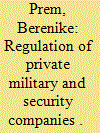

|
|
|
|
|
| Summary/Abstract |
This article studies the limitations of multi-stakeholder initiatives (MSIs) relating to Private Military and Security Companies (PMSCs). It draws attention to three distinct ways in which power operates in and around MSIs: rules, structural positions, and discourses. Based on an analysis of two MSIs, it shows that these governance initiatives strengthen the perspectives of stakeholders that consider PMSCs as normal and legitimate security actors. Western governments and like-minded actors have used the Swiss Initiative and the International Code of Conduct for Security Service Providers to bypass the less privatization-friendly process in the United Nations. MSIs equally perform an important legitimizing function for PMSCs through their discourses and practices. Finally, participants of the MSIs have relegated critical voices, weakening their ability to partake in governing the PMSC industry. By studying the limitations of MSIs through a power-analytical lens, this article therefore points at an important but overlooked dimension.
|
|
|
|
|
|
|
|
|
|
|
|
|
|
|
|
| 10 |
ID:
148674
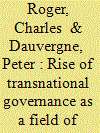

|
|
|
|
|
| Summary/Abstract |
This article surveys the literature on transnational governance (TNG) and makes the case that the field of international relations (IR) is underestimating its scholarly value. Three main charges are commonly leveled at TNG scholarship, which broadly analyzes the importance for global governance of rules and rulemaking to coordinate nonstate actors across borders: (1) That TNG scholarship is too descriptive and nontheoretical; (2) that TNG research lacks methodological rigor, and thus its claims and conclusions are unreliable; and (3) that TNG itself is peripheral to what really matters for understanding the power dynamics of world politics. These criticisms seemed largely true for much of the early TNG scholarship from the 1970s to the 1990s. Yet, as the authors argue and document, TNG scholarship since 2000 is converging around explaining three “stages” of TNG—rule emergence, selection, and adoption—and increasingly is theoretically innovative, methodologically rigorous, and speaks to concerns that are central to the larger field of IR. Given this, greater attention to TNG by IR scholars, textbooks, and courses offers many rewards.
|
|
|
|
|
|
|
|
|
|
|
|
|
|
|
|
| 11 |
ID:
103694
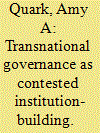

|
|
|
|
|
| Publication |
2011.
|
| Summary/Abstract |
We are in an era of uncertainty over whose rules will govern global economic integration. With the growing market share of Chinese firms and the power of the Chinese state it is unclear if Western firms will continue to dominate transnational governance. Exploring these dynamics through a study of contract rules in the global cotton trade, this article conceptualizes commodity chain governance as a contested process of institution-building. To this end, the global commodity chain/global value chain (GCC/GVC) framework must be revised to better account for the broader institutional context of commodity chain governance, institutional variation across space, and strategic action in the construction of legitimate governance arrangements. I provide a more dynamic model of GCC governance that stresses how strategic action, existing institutions, and dominant discourses intersect as firms and states compete for institutional power within a commodity chain. This advances our understandings of how commodity chain governance emerges and changes over time.
|
|
|
|
|
|
|
|
|
|
|
|
|
|
|
|
| 12 |
ID:
171923
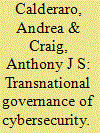

|
|
|
|
|
| Summary/Abstract |
Connectivity infrastructure is constantly expanding, increasing internet access across countries, regions and socio-political contexts. Given the fast-changing geography of the internet, there is a growing demand to strengthen cyber capacity beyond national frameworks, in order to develop a transnationally coherent and coordinated governance approach to cybersecurity. In this context, cyber capacity building initiatives are increasingly central in international debates, with the ambition to support countries in the Global South in fostering their cybersecurity strategy from technical and policy perspectives. This article discusses the key factors explaining states’ efforts to enhance their cyber capacity. Based on a cross-national quantitative research approach, the findings contradict international relations (IR)-derived approaches to cybersecurity, which assume that countries develop their cyber capacity according to external security threats, domestic politics or norms. In line with existing research on the role that science plays in policymaking processes more broadly, our results suggest instead that a country’s science and technical knowledge is the most robust explanation for that state’s cyber capacity level. These findings emphasise the need for policymakers to support countries in the Global South in developing their cyber capacity beyond national security paradigms by strengthening education and technical skills in contexts lacking in this resource.
|
|
|
|
|
|
|
|
|
|
|
|
|
|
|
|
| 13 |
ID:
130913
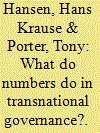

|
|
|
|
|
| Publication |
2012.
|
| Summary/Abstract |
This study examines how numbers in transnational governance constitute actors, objects, and relationships, including relationships of power. We review the existing literatures on numbers for insights relevant to their role in transnational governance, including the ontology of numbers, the history of numbers and their role in governance. On this basis, we set out the main distinctive ways that numbers are implicated in transnational governance. We conclude that studies of transnational governance would benefit from paying more attention to the much overlooked performative role of numbers in governance processes. Numbers have properties that differ from words, and shifts from one to the other in governance, for instance in the displacement of laws or norms with risk models or rankings based on numbers, have particular effects, including political effects on states, firms, individuals, and other actors and institutions.
|
|
|
|
|
|
|
|
|
|
|
|
|
|
|
|
|
|
|
|
|